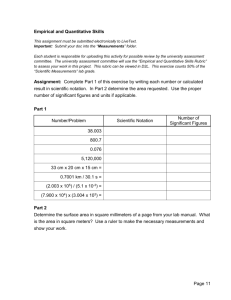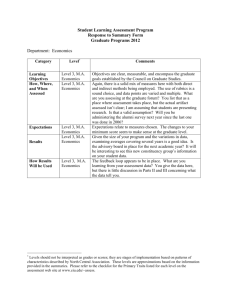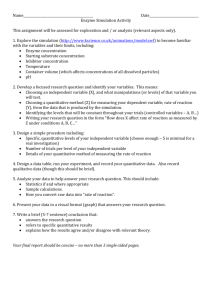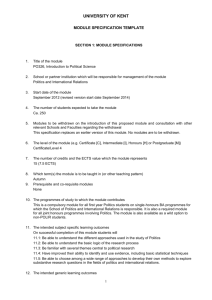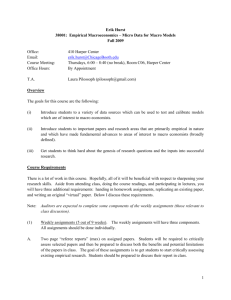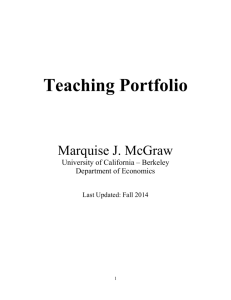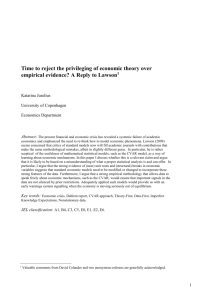Kelly M. Jones Dept. of Agricultural & Resource Economics
advertisement
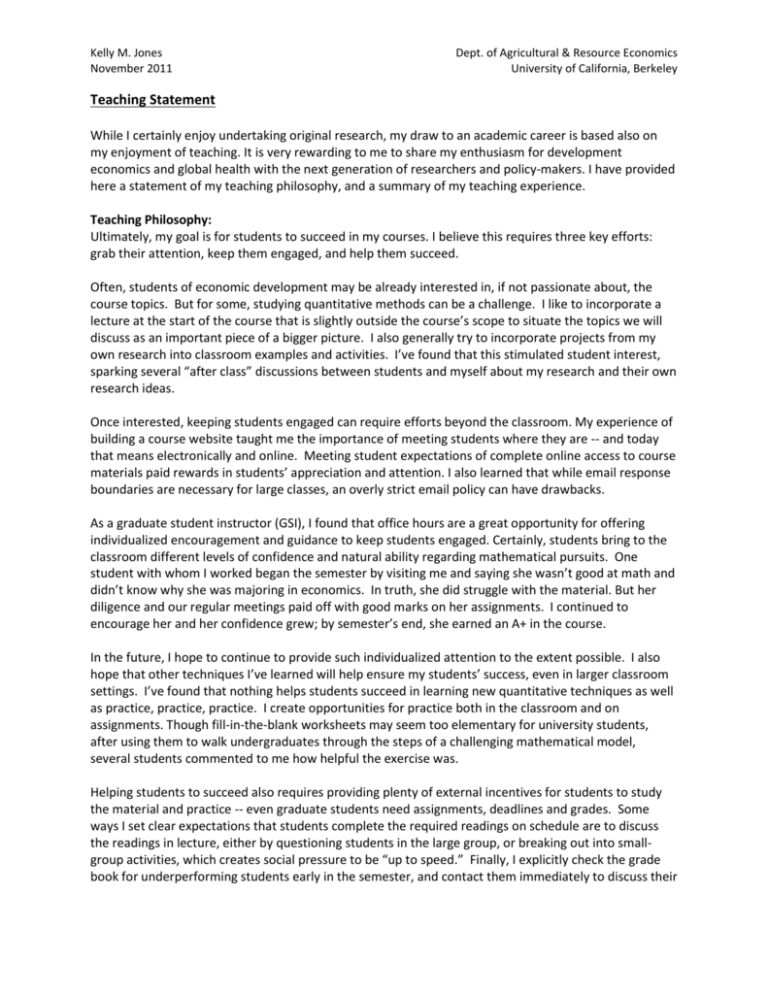
Kelly M. Jones November 2011 Dept. of Agricultural & Resource Economics University of California, Berkeley Teaching Statement While I certainly enjoy undertaking original research, my draw to an academic career is based also on my enjoyment of teaching. It is very rewarding to me to share my enthusiasm for development economics and global health with the next generation of researchers and policy-makers. I have provided here a statement of my teaching philosophy, and a summary of my teaching experience. Teaching Philosophy: Ultimately, my goal is for students to succeed in my courses. I believe this requires three key efforts: grab their attention, keep them engaged, and help them succeed. Often, students of economic development may be already interested in, if not passionate about, the course topics. But for some, studying quantitative methods can be a challenge. I like to incorporate a lecture at the start of the course that is slightly outside the course’s scope to situate the topics we will discuss as an important piece of a bigger picture. I also generally try to incorporate projects from my own research into classroom examples and activities. I’ve found that this stimulated student interest, sparking several “after class” discussions between students and myself about my research and their own research ideas. Once interested, keeping students engaged can require efforts beyond the classroom. My experience of building a course website taught me the importance of meeting students where they are -- and today that means electronically and online. Meeting student expectations of complete online access to course materials paid rewards in students’ appreciation and attention. I also learned that while email response boundaries are necessary for large classes, an overly strict email policy can have drawbacks. As a graduate student instructor (GSI), I found that office hours are a great opportunity for offering individualized encouragement and guidance to keep students engaged. Certainly, students bring to the classroom different levels of confidence and natural ability regarding mathematical pursuits. One student with whom I worked began the semester by visiting me and saying she wasn’t good at math and didn’t know why she was majoring in economics. In truth, she did struggle with the material. But her diligence and our regular meetings paid off with good marks on her assignments. I continued to encourage her and her confidence grew; by semester’s end, she earned an A+ in the course. In the future, I hope to continue to provide such individualized attention to the extent possible. I also hope that other techniques I’ve learned will help ensure my students’ success, even in larger classroom settings. I’ve found that nothing helps students succeed in learning new quantitative techniques as well as practice, practice, practice. I create opportunities for practice both in the classroom and on assignments. Though fill-in-the-blank worksheets may seem too elementary for university students, after using them to walk undergraduates through the steps of a challenging mathematical model, several students commented to me how helpful the exercise was. Helping students to succeed also requires providing plenty of external incentives for students to study the material and practice -- even graduate students need assignments, deadlines and grades. Some ways I set clear expectations that students complete the required readings on schedule are to discuss the readings in lecture, either by questioning students in the large group, or breaking out into smallgroup activities, which creates social pressure to be “up to speed.” Finally, I explicitly check the grade book for underperforming students early in the semester, and contact them immediately to discuss their performance and potentially learn about any relevant issues. I’ve found that early intervention can make a big difference in course outcomes for struggling students. I hope that when students complete my courses, they’ve gained an appreciation for the importance of quantitative investigations in the field of development economics. My aim is to ensure that they also have the technical knowledge to perform such investigations with reasonable rigor, or at a minimum, to assess the quality of quantitative research they read. I believe that quantitative results are the key to getting a policy-maker’s ear, particularly in regard to international development. My courses will not only provide students a solid foundation for future study in the field of development economics, but also equip them for a successful career in policy or beyond. Teaching Experience: Beginning as early as high school, I have been engaged in teaching in some form. As a high school student I worked as a peer-tutor and as an undergraduate worked as a private tutor for high-school students. My passion for teaching prompted my completion of a teaching certification for secondary education, in tandem with my undergraduate degree in mathematics. But of all my teaching experiences, I have most preferred teaching university students, both graduate and undergraduate. Working as a graduate student instructor (GSI) at UC Berkeley, I have most recently taught “advanced topics in economic development”, which introduced theoretical models for a variety of developmentrelated issues and investigated in-depth the empirical literature related to each. Topics included: labor markets, fertility, health, credit, theories of growth, etc. This course required motivating students on the topic, teaching the purpose and mechanics of basic theoretical models, including having students build their own, and explaining and critically reviewing empirical research papers. I have also taught introductory applied econometrics to undergraduates at UC Berkeley and to master’s students at JHU SAIS (School of Advanced International Studies). In both cases, students were required to learn the mechanics of basic multivariate regression and the conditions for identifying causal estimates, as well as the application of econometrics using Stata on individual empirical assignments. In addition to preparing and teaching group sections, I was responsible for creating and grading empirical assignments. During my time as a GSI, I served also as a mentor to students from my classes, who met with me periodically to discuss my educational and professional experiences, and to seek guidance on their own decisions. I advised two students on research for their senior theses and employed another student as a research assistant on my dissertation work. In addition to lecturing, it is these one-on-one interactions with students that make teaching a truly fulfilling experience for me. I believe my teaching is fulfilling for my students as well, as my course evaluations consistently rated more than 6 out of 7 possible points. In an academic position I would most enjoy teaching topics related to the micro-economics of development. This could include quantitative methodologies courses, review courses of topics in development, or topic-specific courses focused on poverty, population, or health. I could also teach health or labor economics, or introductory microeconomics, if needed.
